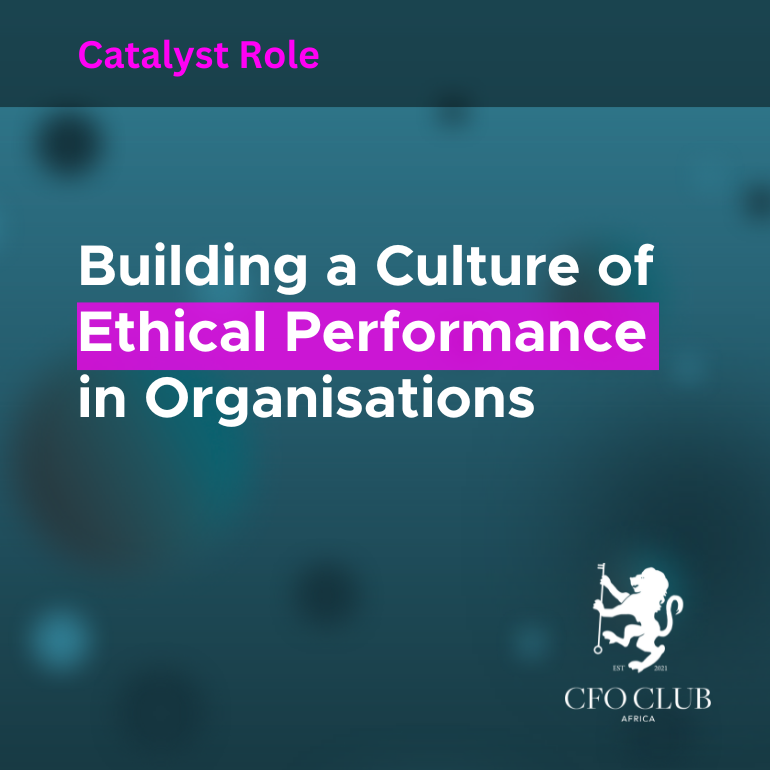Building a Culture of Ethical Performance in Organisations
Case Study: The Tale of XYZ Corporation
In 2018, XYZ Corporation, a well-known tech firm, was hitting record-breaking profits. Yet, beneath the surface, ethical cracks were beginning to show. A recent internal audit had revealed that some employees in high-stakes roles were bending the rules to meet targets. Driven by pressure to deliver rapid growth, these actions were initially unnoticed or dismissed as “just the way things get done here.” It wasn’t until a whistleblower came forward that the board and senior management became aware of the deeper issue: a culture that values performance over integrity. As a result, XYZ Corporation faced reputational damage, a drop in investor confidence, and a series of lawsuits that would take years to resolve.
This case highlights a reality many organisations face: the challenge of balancing performance goals with ethical conduct. As CFOs, we play an important role in guiding organisations not only to financial success but to sustainable success built on a foundation of ethical performance. Here’s a practical guide to building that culture.
1. Set the Tone at the Top
A culture of ethics must start with the leaders, especially the CFO and executive team. When leaders demonstrate honesty, fairness, and transparency, it sets the standard for everyone else. Employees take cues from the top, and if they see leaders acting with integrity, they’re more likely to follow suit.
Practical Tips:
- Be transparent about decision-making processes, especially when they involve ethical choices.
- Encourage open conversations about ethics in management meetings. When faced with difficult decisions, discuss them openly and weigh the ethical implications.
- Lead by example in everyday actions, showing that integrity is non-negotiable.
2. Create a Safe Environment for Open Communication
In XYZ Corporation’s case, it took a whistleblower to expose the unethical practices. Creating a safe environment where employees feel comfortable raising concerns before they escalate is crucial.
Practical Tips:
- Establish clear, accessible channels for employees to report unethical behavior anonymously if necessary.
- Regularly communicate the importance of these channels, so employees know they’re there and feel safe using them.
- Set up “ethics ambassadors” in different departments who employees can approach with concerns or questions.
3. Incorporate Ethics into Performance Metrics
If employees are rewarded solely based on meeting sales targets or financial milestones, they may feel pressured to cut corners. Instead, consider performance metrics that align with ethical standards.
Practical Tips:
- Integrate ethics into the performance review process. Include a section that assesses how employees meet ethical standards or contribute to a positive organisational culture.
- Reward behaviors that align with the organisation’s values, even if they don’t result in an immediate financial win. For example, recognise employees who maintain high ethical standards in challenging situations.
- Avoid setting unrealistic goals that pressure employees to act unethically. Consider a balance of targets that drive performance without encouraging risky shortcuts.
4. Provide Ongoing Training and Clear Guidelines
Ethical training can’t be a one-time exercise. For employees to make ethical decisions, they need to know what’s expected of them and have the tools to act accordingly.
Practical Tips:
- Conduct regular training sessions on ethical conduct, highlighting real-life scenarios employees might face.
- Develop clear policies on ethical behavior and make them easily accessible.
- Reinforce the idea that ethical performance is an ongoing part of everyone’s role, not an occasional or optional standard.
5. Encourage Accountability Across All Levels
In an organisation where everyone is accountable, ethical behavior becomes the norm. Accountability doesn’t mean enforcing a culture of blame, but rather creating a space where people understand the consequences of their actions.
Practical Tips:
- Encourage employees to speak up if they see someone acting against the company’s values and assure them that they’ll be protected.
- Hold leaders accountable to the same ethical standards as employees. When leaders face consequences for unethical actions, it reinforces the importance of integrity.
- Make it clear that no one is “above the rules,” whether it’s a senior executive or a new hire.
6. Regularly Measure and Improve Ethical Culture
Just as we track financial performance, ethical performance should be regularly assessed. Conducting periodic evaluations of the organisation’s ethical climate can provide valuable insights.
Practical Tips:
- Use employee surveys to gauge perceptions of ethical behavior within the organisation. Ask specific questions like, “Do you feel comfortable reporting unethical behavior?” and “Do you believe leadership values integrity over performance?”
- Review any ethics-related reports or concerns raised by employees to identify patterns and areas for improvement.
- Use external auditors or consultants to get an unbiased perspective on the organisation’s ethical culture.
Conclusion: Building a Lasting Culture
XYZ Corporation’s story shows us how even the most profitable organisation can face downfall without a strong ethical foundation. Building a culture of ethical performance is not an overnight task. It requires continuous effort, commitment from leadership, and the involvement of everyone in the organisation.
As CFOs, we are uniquely positioned to drive this cultural shift by balancing financial goals with the integrity that sustains long-term success. By embedding ethics into every aspect of the organisation, we protect not only the bottom line but also the people, reputation, and values that define us. Remember, sustainable success comes from doing what’s right, not just what’s profitable.

